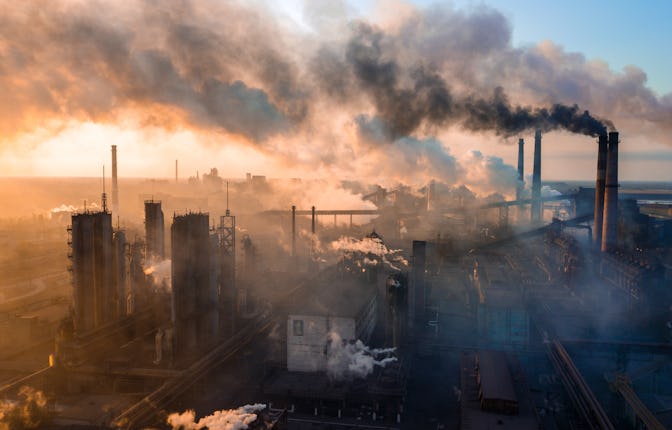A new study shows a surprising connection between climate change and lung cancer
The breakthrough research explains why so many non-smokers get sick with the disease.

Everyone knows that smoking can increase your chances of getting lung cancer because it’s been drilled into us since birth. In fact, for me, the association between smoking and lung cancer is so strong that I always wondered how people who had never smoked a day in their lives ended up dying from the disease. Well, scientists seem to have unlocked that mystery and it turns out that air pollution is the culprit.
It may seem like common sense to assume that inadvertently breathing filthy air can wreak havoc on our bodies in similar ways as purposely inhaling toxic fumes, but science doesn’t run on assumptions. And while scientists have long known that there’s a connection between air pollution and lung cancer, they only now understand how it works.
Charles Swanton, a cancer researcher at the Francis Crick Institute in England, presented what is being hailed as a breakthrough in oncological research at the European Society for Medical Oncology (ESPO) conference in Paris on Saturday. According to Swanton’s research, fine particulate matter in pollutants like car fumes can enter the body as we breathe and wake up dormant lung cells in a way that causes them to become cancerous, EurekAlert reported.
This is a breakthrough, not just because it explains how some lung cancers are formed, but because it adds to a growing body of research that proves how devastating climate change is for human health. “Globally, more people are exposed to unsafe levels of air pollution than to toxic chemicals in cigarette smoke, and these new data link the importance of addressing climate health to improving human health,” Swanton said in his speech at the ESPO conference.
“The same particles in the air that derive from the combustion of fossil fuels, exacerbating climate change, are directly impacting human health via an important and previously overlooked cancer-causing mechanism in lung cells,” Swanton explained. In other words, the toxic hazards that are destroying our ecosystem are also destroying our bodies.
Every year, about 130,000 people around the world die of lung cancer. Six thousand of those people are “never smokers” — people who have never smoked a cigarette. Yes, that’s only about 5% of the people who die of lung cancer, but like the deaths caused by smoking, air pollution is also preventable. Unlike smoking, however, we can’t choose whether or not to breathe polluted air. “We have no control over what we all breathe,” Swanton said in his address.
Scientists hope that this breakthrough will help researchers create a drug that prevents people from being vulnerable to pollutants, but it’s important to note that the findings of the research that Swanton announced at ESPO are so new that they haven’t been peer-reviewed. But it does confirm the findings of other recent research into the potential for creating pills to combat cancer.
Even though scientists have thought for a long time that air pollution could be linked to lung cancer, they couldn’t prove it. “Air pollution is associated with lung cancer but people have largely ignored it because the mechanisms behind it were unclear,” Swanton explained, The Guardian reported. But thanks to this new research, scientists now understand exactly how pollutants work in the body. Hopefully, that means that the undeniable link between air quality and health will no longer be ignored.